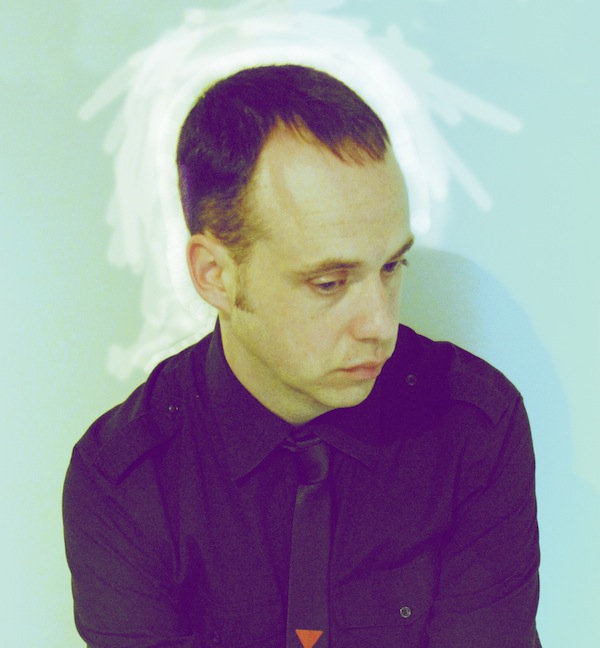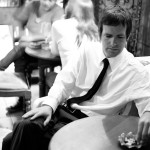
Like his hero Aphex Twin, Solvent squeezes an incredible amount of emotion out of nothing but synths and samplers. At least that was the case on his two-disc Demonstration Tape collection, a decade-spanning retrospective that could have been called Soul of a New Machine…if Fear Factory hadn’t taken the title way back in 1992. The recently-released Subject To Shift, Solvent’s second proper LP for Ghostly–the previous one being 2004’s Apples & Synthesizers–takes the moody machine template of his earlier work to another level by applying shifty electro/coldwave/avant-techno beats to realms usually reserved for the Faint (“Don’t Forget to Phone”), Kraftwerk (“Formulate,” “Caught a Glimpse”) and, err, black-metal (the demon-derived vocals of “Take Me Home”). And then there’s “Loss For Words,” the closest producer/singer Jason Amm has ever come to crafting a straight-up synth-pop song, as opposed to a straight-up synth-pop song that’s haunted by the nightmares of Johnny 5 from Short Circuit.
Solvent sparks a rare U.S. tour at Wierd’s weekly New York party–the one helmed by this guy–tonight, so we spoke to him at length about everything from the second-coming of electroclash to the sorely-overlooked basslines of Skinny Puppy. The Toronto-based musician also let us premiere the video to “Loss For Words,” one of the most heartbreaking animated shorts we’ve seen since Radiohead’s “Paranoid Android” clip. Real talk.
“I’m definitely disappointed that it was mainly the blatant, tasteless aspects–the Peaches end of the spectrum–that seemed to catch on”
Can you start by giving us some background on the new record? It’s taken you forever to finish, hasn’t it?
Subject to Shift has been done since [last] August, and since then, I’ve been working in a different way–using only hardware, and taking a more improvised approach. It’s sort of a return to my roots, but also reflects a new-found interest in acid and other forms of raw late-’80s/early-’90s dance music.
I’ve been working on [the new record] for the past five years, but the majority of it was done during the first half of 2009. It’s definitely the most stylistically diverse record I’ve done, and I’m not sure that there’s any sort of obvious unifying concept. There’s a few ‘classic’ Solvent-style instrumentals on there for good measure, but I would say that the majority of the songs on the record are darker and more vocal/song-oriented than past Solvent material. Several people have told me that it sounds like a different singer on every song, but it’s all me.
Is your old side project Black Turtleneck still active at all, and how did that come about in the first place?
Black Turtleneck is no longer active. The other guy involved in the project, Thomas Sinclair, approached me about working with him as a vocalist, which I was looking for at the time. I wanted to do a Soft Cell/Yazoo-type synth-pop duo, where I would be the quiet synth nerd in the background. He ended up becoming involved in the music and production as well, which initially seemed like a good idea, but was actually a problem for me in the end. I just wanted a singer/lyricist, and the other input was mainly a distraction, and often a compromise.
“My Radio” (from Ghostly’s seminal Disco Nouveau compilation) is still considered one of your biggest singles–a rare example of modern electro done right. Looking back, does it surprise you that electroclash caught on with kids, at least for a little while? And doesn’t it kinda seem like some of its substance-less ideas came full circle with the popularity of Justice and that whole Ed Banger/Institubes sound?
Considering the enduring popularity of synth-pop bands like Depeche Mode, Human League and Soft Cell, I’m not surprised that electroclash also became popular. Songs like “Don’t You Want Me?” and “Tainted Love” never left the public conscious. And since the mid-’80s, there had been a real lack of good pop music produced with blatant synthesizer sounds. Electroclash became the first music to really address this, so it understandably got a lot of attention. It’s had a huge and lasting impact, too, not just with all of that bombastic buzzsaw techno like Justice, but also in mainstream pop and hip hop, from Britney Spears to Kanye West.
I’m definitely disappointed that it was mainly the blatant and tasteless aspects–the Peaches end of the spectrum–that seemed to catch on, rather than the subtle, classicist sides. I wish it could’ve produced another Vince Clarke-like synthesizer genius, or another band with the kind of depth and originality of something like OMD or Fad Gadget.
“Sometimes the vocoder is perfect for a given track, but I do also use it as a crutch”
One of the things that’s integral to your music is its melancholic side–the sense that the songs are quite emotional despite being inherently electronic, and to some degree, inhuman. Has that been a goal of yours all along, and do you feel like that idea is missing from a lot of today’s dance/electronic music?
This hasn’t been a goal that I set out to achieve. These melodies just come out of me, and I feel such a deep and profound emotional connection to them, it’s beyond anything I could ever hope to express with words. It’s very gratifying for me when people can hear this in my music; it makes me feel as if they are able to know me somehow. It’s hard to find deeply emotional and expressive music in general. It’s no more lacking in electronic music than in acoustic music, in my opinion. Aphex Twin has produced some of the most personal and emotional music I have ever heard, for example. Then again, some of my favorite Aphex Twin tracks are completely cold, hard, inhuman, and emotionless.
Ironically enough, one of the things Pitchfork pointed out in a review of Demonstration Tape was how hopeful and major key your songs are. Were they missing the point a bit? I mean, while some of the songs are definitely upbeat/uplifting, there’s definitely a darker side to a lot of it.
I suppose there are a few darker songs on there. “Think Like Us,” for example. I definitely think that the Pitchfork review was pretty far off the mark. I’d say that the dominant mood in my music is a feeling of sadness–longing for the past, rather than an optimism for the future. There might be a few full-on happy/upbeat songs, but most of the times the melodies are far too melancholic to be mistaken for happy. Anyway, I don’t care about 99-percent of the records that they talk about on Pitchfork, and they rarely review the kind of records that I care about, so it’s no big surprise or disappointment to me when a Pitchfork reviewer doesn’t get Solvent.
You were described as a “robot music composer” in your original bio. Are you alluding to the fact that you make electronic music from a ‘machine’s perspective’, much like how Kraftwerk and other artists explore the blurred line between man and machines?
I actually wrote the foundations of that bio myself ages ago, when I used to release my own records on Suction Records. That “robot music” description is actually getting pretty old; I should probably ditch that now. Originally, I meant it as some kind of reference to antiquated technology–something that was once futuristic and daunting, but that has become more familiar and even nostalgic over time, much like analog synthesizer sounds in general. But most people just read it as some kind of boring Kraftwerk cliche. And understandably so.
What are some not-so-obvious influences that you’ve had over the years?
I think that the most obvious and direct influence on my music has been Aphex Twin, and that’s a reference that rarely comes up when people talk about Solvent. Initially, I was always compared to Aphex Twin and Autechre, but people stopped bringing those names up after I started name-dropping synth-pop bands in my interviews and press releases. Another big influence for me is Skinny Puppy. I don’t think many people can make the connection, because they’re focusing on the dark/horror aspects and distorted vocals [of their music], instead of the basslines and drum machine techniques. Skinny Puppy had some amazing, often funky basslines, and I’ve definitely been influenced by the way that they would heavily process the 808 drums with things like distortion and tight, metallic delays.
Probably the most non-obvious influence would be The Beatles. I rarely go out of my way to listen to them anymore, but I was absolutely obsessed with them when I was young, like from the ages of 8 to 12 I would listen to them endlessly. I’m convinced that this has played a significant part in my strong melodic/pop tendencies.
“That music was an absolute fuck-you to techno culture, and that’s what I loved about it”
You use a vocoder effect on your vocals a lot. Has the crossover popularity of people like Daft Punk made you consider dropping that approach completely?
I suppose if vocoder started turning up on every record on the radio–like how Auto-Tune has been–that might make me drop it. But no, I wouldn’t stop using a vocoder just because someone popular like Daft Punk used it. Anyway, I think that when I use the vocoder it somehow sounds different than when anyone else uses it; it’s like you can hear my voice and personality still coming through. Not a lot of other people use a vocoder for melodic pop vocals in the way that I do. That being said, the main reason that I use a vocoder so regularly is because I’ve wanted to make vocal pop songs, but I’d rather not sing. I’ve got some songs on my new record where I’m singing without a vocoder, and it took me forever to record them. I’m just way too critical and self-conscious of my natural voice. Don’t get me wrong–sometimes the vocoder is perfect for a given track, but I also use it as a crutch.
What’s the deal with your label, Suction Records? When did you meet Greg (Lowfish), and why did you two hit it off, personally and creatively?
Gregory and I ran Suction Records together from 1997 to 2007, mainly to release our own records. [Ed. Note: It was relaunched on a limited basis recently.] But we did release some other artists as well, such as GD Luxxe and Skanfrom (the latter now well-known as Sleeparchive in the techno world). We met in junior high, so I’ve known Gregory since we were 14 or so. Besides one other friend, we were basically the only people in our high school who were heavily into electronic music, especially when it came to stuff like Skinny Puppy and Front 242. He even had a studio during high school and was producing music, which I thought was amazing. We didn’t really hang out together, though, him being a clean-cut type and me being a full-on goth. (Those people didn’t mix during the ’80s–see Pretty In Pink.), But anyway, we kept in touch and became good friends when I started producing music in the early ’90s.
Speaking of people not mixing well together, what were your tours with VNV Nation and Freezepop like? Did people ‘get you’, or did a lot of the music fly over their heads?
Freezepop is definitely more popular than Solvent, but not by such a huge margin. So it really wasn’t such an ‘opening act’ scenario, and it seemed like a lot of the Freezepop fans were either familiar with Solvent, or at least were able to get into it. Opening for VNV Nation was tough, because they are like the biggest band in that whole EBM/goth scene, with really passionate fans, most of whom were really just there to see VNV. They weren’t too interested in hearing an opening act, especially one with such a different sound. Having come from an industrial/goth background, I guess I sort of figured I knew something about that crowd and that my music could win them over, but instead I was met with a lot of disinterest.
You’ve been able to cross over between club audiences and living room listeners, though. Do you like toeing that line?
When I started off, I was totally immersed in that whole Rephlex/Warp Records side of things, and I was really against club music. Those people probably considered what they were doing as some form of techno, but to me that music was an absolute fuck-you to techno culture, and that’s what I loved about it. And before that I was really into new wave, synthpop, and EBM, where I would go to alternative and goth type clubs. People danced in these clubs, but in my mind none of it was music that was made for dancing; it was songs that you could dance to. If anyone had suggested to me during this time that what I was listening to or making was techno or dance music, I would’ve been totally offended.
I still think that 99-percent of club music is totally foul, and nothing depresses me more than being stuck in some club listening to hours of pounding cookie-cutter dance music. So as you can imagine by what I’ve said so far, it has never been a goal of mine to straddle this line. I’ve always just tried to make good songs with good beats, and occasionally they end up working in a club/DJ context. If you read a lot of interviews with Depeche Mode, they say more or less the same thing–any dance club success that they have is unintentional, and isn’t a factor that would influence the direction or outcome of a song. I’ve come to respect some periods of dance music, though, like early Chicago acid house. I was just reading this article in Wire about the Roland TB-303 bass line synthesizer, where they described how the earliest acid records (“I’m Losing Control” by Sleezy D, and “Acid Tracks” by Phuture) initially cleared the dance floor when Ron Hardy played them at the Music Box club, before they eventually became the biggest dance records in Chicago. Now this seems like an exciting chapter in dance music–where the biggest DJ in the biggest club is willing to play something totally alien, and will play it again even after clearing the floor with it. This is the kind of individuality and conviction that is seems to be totally devoid in clubs, where the DJ plays what the punters want to hear, instead of being there to tell the punters what they should want to hear.
Do you still collect vintage analog gear, or do you have more than enough of it already?
I have a pretty good collection of vintage synths and drum machines, and I usually pick up one or two new things every year, but my collection isn’t that huge. I don’t have any modular synth systems for one thing. If I could afford to, I would love to have a museum-sized collection! No doubt, I am totally obsessed with synthesizers, and you can be sure that if I ever win the lottery I’ll be glued to eBay for weeks.
While I use a computer for sequencing and recording audio, I’m pretty strict about using only analog synthesizers and drum machines. I’m not tempted to use soft synths or even virtual analog hardware synths, because to me they just don’t sound very good. They’re very flat and one-dimensional sounding. Using analog gear definitely adds a lot of work to the process–tuning and synchronization issues, and the fact that they’re always breaking down–but it’s worth the effort, for the sound. Taking a fully digital, all-software approach is not even an option, in my mind. It would be like choosing to be colorblind over seeing everything in color.
Let’s talk about your remix work to wrap things up…What was your initial reaction to Soft Cell asking for one? Were you nervous about the prospect of messing with their music?
I’ve remixed Soft Cell twice now! They were my favorite band growing up, and they’re still up there as one of my all-time favorites, for sure. So of course, remixing Soft Cell has definitely been career-fulfilling. It would’ve been tough if I’d been asked to remix one of Soft Cell’s masterpieces, like say “Memorabilia” or “Say Hello Wave Goodbye,” but the two songs I remixed were far from perfect, so there was a lot of room for me to rework them in the remix.
What are some artists you’d love to remix who haven’t asked just yet?
Well I just remixed a song with Alison Moyet singing, and I made it sound like a Yazoo song, so that was definitely another big one that I’ve able to cross off my list. (Yazoo’s “Upstairs at Eric’s” is my all-time favorite record.) Remixes are nice, but I think at this point the ultimate thing for me would be to collaborate on some songs with one of my favorite singers, like Alison, Marc Almond, Siouxsie Sioux or Phillip Oakey from the Human League. I would actually love to join the Human League–not that I’ve much liked anything that they’ve released since 1982, but somehow I’m totally convinced that I could make a killer Human League record with Phillip and the girls! Another thing I’d love would be some sort of recognition or validation from one of the “big three”–my absolute synthesizer heroes, Daniel Miller, Vince Clarke, and Richard D. James. Actually, I know that Daniel Miller bought and owns a Solvent 7-inch, but if I could have something a little more direct from any of those three geniuses, I could definitely die a much happier man.



